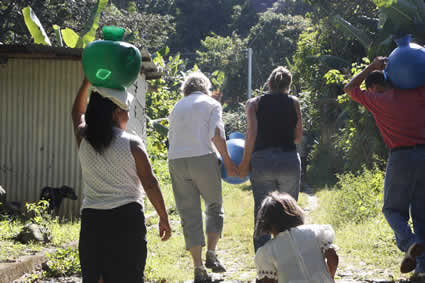Have you heard about the Tap
Project?
It's an ingenious idea. UNICEF is working to help the 768
million people around the world without access to clean water. This year you can help by
taking a challenge to give up access to something far less vital than water–your cell
phone.
You are challenged to give up your cell phone. You register
your cell phone, put it down and don't touch it, for as long as you can go. For each
10 minutes you don't touch your phone, you can give a day's fresh water to someone without
access to it.
I don't know how it works and who the people are who are supplying
the funds to bring fresh water to people in need, but I thought...what the heck. I
have a cell phone that goes for days at a time without being used for anything important.
As of the last moment I checked, people participating in the project have donated
the equivalent of 4.5 years of clean water
It does mean not only no phone calls or text messages, but
no selfies, no Instagram, no Word with Friends. I can do without that for a day or so to
bring fresh water to people without it.
Almost every profile I read of children waiting for Compassion
sponsors includes among their household chores "carrying water." Some of
my sponsored children carry water over a mile twice a day so that their families can have
water to cook with and wash with...and those water sources are not necessarily safe water
sources.
The farthest I carry water is when I fill a pint sized glass and
carry it all. the. way. across the family room to the recliner, where I drink it while I
watch television.
Many of the daily blog entries for Compassion concern water.
The walk from Isabel’s home to the river took about 30 minutes. The view of the river was stunning, and most of the walk was down a very steep slope.
Upon reaching the river, I found a wash house where people gather to bathe. This is also where a pavilion is set up to wash clothes.
We learned that this water, like most water in the developing world, is contaminated and a cause of illness to the families who rely on it.
We filled our five-gallon water jugs from the river and, with each jug now weighing about 40 pounds, began trudging back up the hill to Isabel’s home.
Isabel placed her jug on her head and slowly but steadily walked up the steep path. The men in our sponsor group slung their jugs to their shoulders, while the women worked in pairs to lug the heavy jugs up the hill (which, with each step, seemed more like a mountain).
Finally, one of the women in our group tried carrying her water jug on her head. As I struggled up the hill, it seemed insane to place such a heavy jug on my head – especially without a pad like the local women use. But after my friend found this method easier, I decided to follow her example. Indeed, the jug was hard and heavy, but this was definitely easier than anything else I had tried.
I was able to slowly, steadily, step-by-step, make it the rest of the way to the top of the hill. When we finally reached Isabel’s house I had a real feeling of accomplishment, having contributed to the effort of bringing water to this family’s home. We all had a new understanding of walking in the footsteps of the poor, and a new appreciation of their daily task of fetching water.
So much time and energy is spent each day by Isabel and her children just doing what they must to survive. Gathering water and obtaining food is the main task of each day. There is little time or energy, let alone financial resources, to spend on school work or economic tasks such as developing a business.
If, instead of spending hours each day gathering water, these families were able to get water in only a fraction of that time, and if that water were clean rather than a cause of illness, just think of the difference it would make in their lives!
How much different would our lives be if we had to spend two to four hours each day just getting water to cook and do dishes?
I figure if I can do anything to help, if it means giving up Word
with Friends or Selfies for a day or so, that's not so bad.
I first started the app running and within 2 hours, my battery had
died...apparently the phone needs to be running all the time. So I plugged it in and
it has been going for more than 13 hours now, which is nearly 80 days of fresh water. I
don't know how long I'll stay connected to the Tap site, but even if it's only for one
day, when I sit down and drink my pint of fresh bottled ice water, I won't feel quite
so guilty about walk my sponsored children are making to bring water to their homes
tomorrow.


1 comment:
I'm going to do this--and challenge my students!
Post a Comment